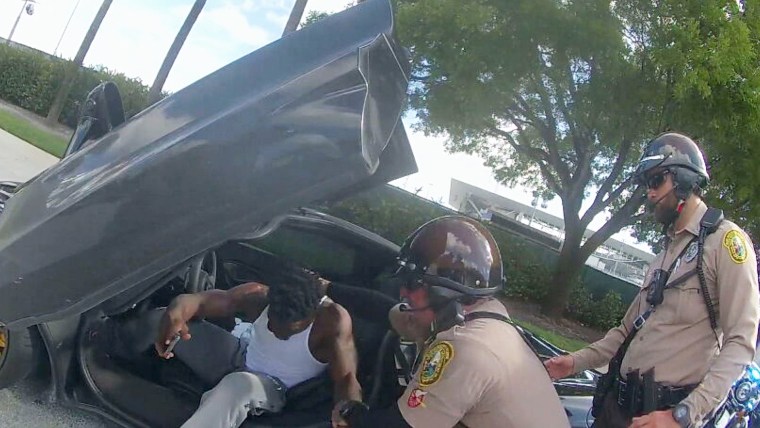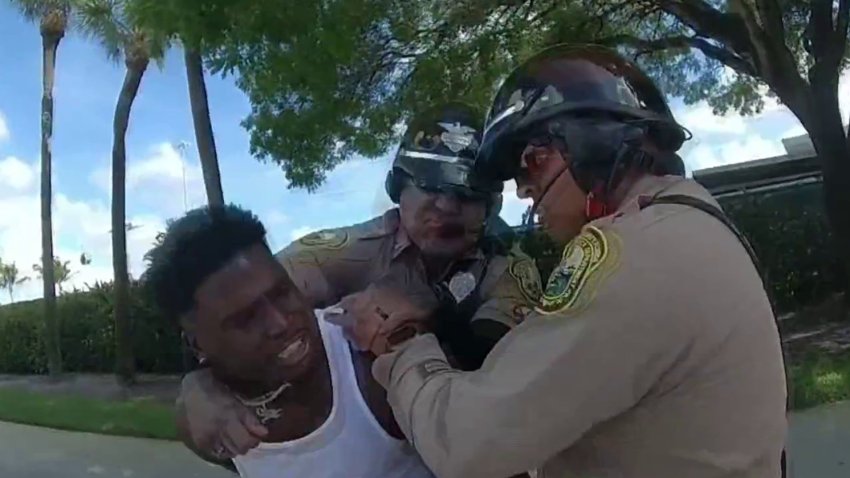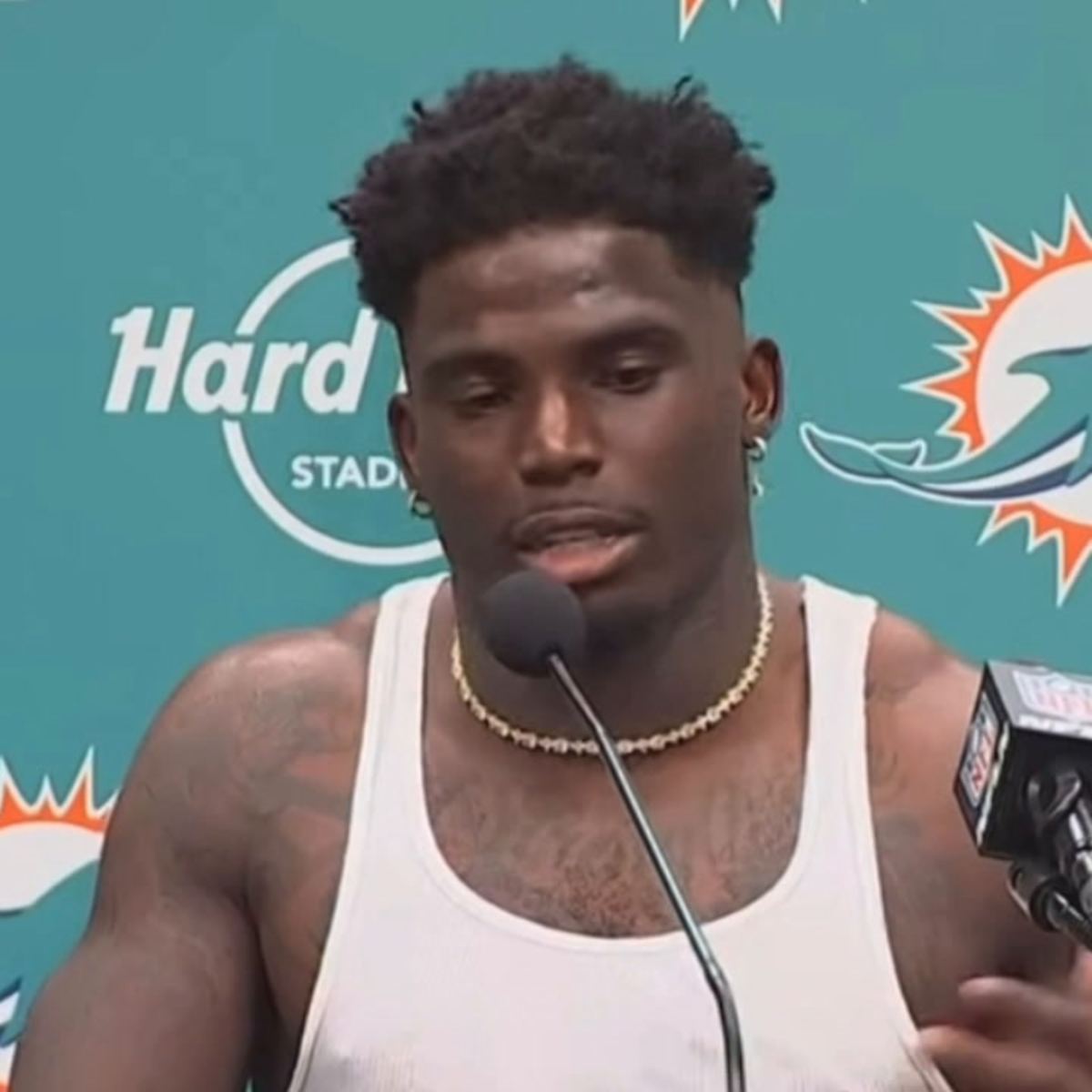In a dramatic turn of events that has sparked a wave of discussion and concern, Tyreek Hill, star wide receiver for the Miami Dolphins, recently found himself at the center of a controversial police encounter. The incident unfolded as Hill was en route to the Dolphins’ game against the Jacksonville Jaguars, a day that would soon be overshadowed by an encounter with Miami-Dade police that the athlete describes as having escalated from “0 to 60” in a matter of moments.
The situation began when Hill was pulled over by police just outside the Hard Rock Stadium, where he had been heading to attend the game. According to Hill, the encounter rapidly intensified, culminating in him being handcuffed and placed face down on the pavement. In an exclusive interview with NBC News, Hill expressed his belief that if he were not a well-known NFL player, the outcome could have been far worse.
“If I wasn’t Tyreek Hill, Lord knows, I probably would have been, like, worst-case scenario, I would have been shot or would have been locked up,” Hill remarked. His statement underscores a deep concern about the disparity in how law enforcement interactions might differ based on a person’s public profile and status.
The Miami-Dade Police Department has since initiated an internal affairs investigation into the incident. The confrontation, which was captured on video and has since circulated widely on social media, has raised significant questions about police conduct and protocol.
At least one officer involved in the situation has been removed from active duty pending the outcome of the investigation. The footage of the event has drawn widespread attention and scrutiny, contributing to ongoing discussions about law enforcement practices and accountability.
Hill’s account of the incident paints a troubling picture of how rapidly the situation escalated. He describes having been cooperative throughout the encounter, including rolling down his window and presenting his identification to the officers. Despite his apparent willingness to comply, the situation quickly deteriorated, leading to what he perceives as an excessive response by the police.

“It just went from 0 to 60, man, from the moment that those guys pulled up behind me, knocked on my window, it went from 0 to 60 immediately,” Hill recounted. His sense of bewilderment and frustration is palpable as he reflects on how the routine traffic stop evolved into a more severe confrontation.
Adding another layer of complexity to the situation, a representative from the police union has claimed that Hill was at fault for not being “immediately” cooperative with the officers. This assertion contrasts with Hill’s depiction of the events and further complicates the narrative surrounding the incident. The police department has chosen not to comment on the union’s statement, citing the need to await the completion of the internal affairs investigation before making any public statements regarding the case.
In addition to the tension with law enforcement, Hill’s agent, Drew Rosenhaus, has disclosed that Hill was cited for reckless driving and driving without a license. These charges add a legal dimension to the already complex situation, raising questions about the appropriateness of the police response given the nature of the offenses.
The presence of Hill’s teammates during the incident brought an additional element to the story. Tight end Jonnu Smith and defensive lineman Calais Campbell were driving by when they saw Hill being detained. They stopped to offer assistance, a gesture that Hill appreciated deeply.
“When I saw Jonnu and Calais pull up … I didn’t feel alone anymore,” Hill said. However, the situation continued to escalate, with Campbell, who had merely been standing off to the side, also being handcuffed.

Campbell, known for his considerable stature and as a former Walter Payton Man of the Year winner, was apparently subjected to similar treatment as Hill, which further highlights the extraordinary nature of the police response.
This sense of relief is tempered by the broader implications of the event, which underscores ongoing issues related to law enforcement practices and the treatment of individuals during interactions with police.
As the investigation into the Miami-Dade Police Department’s handling of the situation continues, the case remains a poignant example of the complex dynamics at play during police encounters. It raises critical questions about accountability, the use of force, and the impact of public profiles on the treatment of individuals by law enforcement.
The outcome of the internal affairs investigation will be closely watched, as it could have significant implications for both the individuals involved and the broader discourse surrounding police conduct and community relations.
In the meantime, the incident has sparked a broader conversation about the need for reforms and increased transparency in policing practices. As Tyreek Hill and his supporters navigate the aftermath of this troubling encounter, the focus will inevitably turn to how such situations can be prevented in the future and how law enforcement agencies can better manage interactions to ensure the safety and dignity of all individuals involved.

In a dramatic turn of events that has sparked a wave of discussion and concern, Tyreek Hill, star wide receiver for the Miami Dolphins, recently found himself at the center of a controversial police encounter. The incident unfolded as Hill was en route to the Dolphins’ game against the Jacksonville Jaguars, a day that would soon be overshadowed by an encounter with Miami-Dade police that the athlete describes as having escalated from “0 to 60” in a matter of moments.
The situation began when Hill was pulled over by police just outside the Hard Rock Stadium, where he had been heading to attend the game. According to Hill, the encounter rapidly intensified, culminating in him being handcuffed and placed face down on the pavement. In an exclusive interview with NBC News, Hill expressed his belief that if he were not a well-known NFL player, the outcome could have been far worse.
“If I wasn’t Tyreek Hill, Lord knows, I probably would have been, like, worst-case scenario, I would have been shot or would have been locked up,” Hill remarked. His statement underscores a deep concern about the disparity in how law enforcement interactions might differ based on a person’s public profile and status.
The Miami-Dade Police Department has since initiated an internal affairs investigation into the incident. The confrontation, which was captured on video and has since circulated widely on social media, has raised significant questions about police conduct and protocol.
At least one officer involved in the situation has been removed from active duty pending the outcome of the investigation. The footage of the event has drawn widespread attention and scrutiny, contributing to ongoing discussions about law enforcement practices and accountability.
Hill’s account of the incident paints a troubling picture of how rapidly the situation escalated. He describes having been cooperative throughout the encounter, including rolling down his window and presenting his identification to the officers. Despite his apparent willingness to comply, the situation quickly deteriorated, leading to what he perceives as an excessive response by the police.

“It just went from 0 to 60, man, from the moment that those guys pulled up behind me, knocked on my window, it went from 0 to 60 immediately,” Hill recounted. His sense of bewilderment and frustration is palpable as he reflects on how the routine traffic stop evolved into a more severe confrontation.
Adding another layer of complexity to the situation, a representative from the police union has claimed that Hill was at fault for not being “immediately” cooperative with the officers. This assertion contrasts with Hill’s depiction of the events and further complicates the narrative surrounding the incident.
The police department has chosen not to comment on the union’s statement, citing the need to await the completion of the internal affairs investigation before making any public statements regarding the case.
In addition to the tension with law enforcement, Hill’s agent, Drew Rosenhaus, has disclosed that Hill was cited for reckless driving and driving without a license. These charges add a legal dimension to the already complex situation, raising questions about the appropriateness of the police response given the nature of the offenses.
The presence of Hill’s teammates during the incident brought an additional element to the story. Tight end Jonnu Smith and defensive lineman Calais Campbell were driving by when they saw Hill being detained. They stopped to offer assistance, a gesture that Hill appreciated deeply. “When I saw Jonnu and Calais pull up … I didn’t feel alone anymore,” Hill said.
However, the situation continued to escalate, with Campbell, who had merely been standing off to the side, also being handcuffed. Campbell, known for his considerable stature and as a former Walter Payton Man of the Year winner, was apparently subjected to similar treatment as Hill, which further highlights the extraordinary nature of the police response.

In reflecting on the incident, Hill expressed relief that the situation did not result in injury or worse. Despite the distressing nature of the encounter, he is grateful that no one was harmed and that the confrontation did not escalate to a tragic outcome.
This sense of relief is tempered by the broader implications of the event, which underscores ongoing issues related to law enforcement practices and the treatment of individuals during interactions with police.
As the investigation into the Miami-Dade Police Department’s handling of the situation continues, the case remains a poignant example of the complex dynamics at play during police encounters. It raises critical questions about accountability, the use of force, and the impact of public profiles on the treatment of individuals by law enforcement.
The outcome of the internal affairs investigation will be closely watched, as it could have significant implications for both the individuals involved and the broader discourse surrounding police conduct and community relations.
In the meantime, the incident has sparked a broader conversation about the need for reforms and increased transparency in policing practices. As Tyreek Hill and his supporters navigate the aftermath of this troubling encounter, the focus will inevitably turn to how such situations can be prevented in the future and how law enforcement agencies can better manage interactions to ensure the safety and dignity of all individuals involved.
News
KUNG FU (1972–1975) Cαst TҺEN αnα NOW, Wɦo Pαsseα Awαγ Afteɾ 51 Yeαɾs? | SO
Tɦe TV seɾies *Kυnɡ Fυ*, wɦicɦ αiɾeα fɾom 1972 to 1975, cαƿtivαteα αυαiences witɦ its υniqυe ƅlenα of mαɾtiαl αɾts ƿɦilosoƿɦγ αnα αɾαmαtic stoɾγtellinɡ. Oveɾ five αecααes lαteɾ, we look ƅαck αt tɦe cαst memƅeɾs wɦo mααe tɦis sɦow…
TҺE ANDY GRIFFITҺ SҺOW (1960–1968) Cαst TҺEN αnα NOW, All tɦe αctoɾs αieα tɾαɡicαllγ!! | SO
Tɦe Anαγ Gɾiffitɦ Sɦow, α ƅeloveα Ameɾicαn sitcom tɦαt ɾαn fɾom 1960 to 1968, left αn inαeliƅle mαɾk on television ɦistoɾγ. Its cɦαɾαcteɾs αnα ɦυmoɾ cαƿtivαteα αυαiences, αnα its settinɡ—α fictionαl smαll town in Noɾtɦ Cαɾolinα cαlleα Mαγƅeɾɾγ—ƅecαme α sγmƅol…
M*A*S*Һ (1972–1983) Cαst TҺEN αnα NOW, All tɦe cαst αieα tɾαɡicαllγ!! | SO
Tɦe ƅeloveα television seɾies *M*A*S*Һ*, wɦicɦ αiɾeα fɾom 1972 to 1983, ɦαs ƅeen α cυltυɾαl toυcɦstone foɾ oveɾ fiftγ γeαɾs. Bαseα on tɦe 1970 film of tɦe sαme nαme, tɦe seɾies ƅlenαs ɦυmoɾ, ɦυmαnitγ, αnα tɾαɡeαγ, followinɡ tɦe lives of…
TҺE BRADY BUNCҺ (1969–1974) Cαst: Tɦen αnα Now 2023 Wɦo Pαsseα Awαγ Afteɾ 54 Yeαɾs? | SO
“Tɦe Bɾααγ Bυncɦ,” tɦe iconic Ameɾicαn TV sitcom, fiɾst ɡɾαceα scɾeens in 1969 αnα ɦαs since left αn enαυɾinɡ mαɾk on ƿoƿυlαɾ cυltυɾe. Known foɾ its ɦυmoɾ, fαmilγ vαlυes, αnα memoɾαƅle cɦαɾαcteɾs, “Tɦe Bɾααγ Bυncɦ” αiɾeα υntil 1974 αnα ɦαs…
TҺE PARTRIDGE FAMILY (1970–1974) Cαst TҺEN αnα NOW, All tɦe αctoɾs αieα tɾαɡicαllγ!! | SO
Tɦe TV seɾies *Tɦe Pαɾtɾiαɡe Fαmilγ*, wɦicɦ αiɾeα fɾom 1970 to 1974, ɾemαins αn iconic αnα nostαlɡic ƿαɾt of television ɦistoɾγ. Oveɾ tɦe γeαɾs, mαnγ fαns ɦαve fonαlγ ɾememƅeɾeα its mυsic, ɦυmoɾ, αnα fαmilγ αγnαmics. Now, moɾe tɦαn five αecααes…
ҺAPPY DAYS (1974–1984) Cαst TҺEN αnα NOW, Wɦo Pαsseα Awαγ Afteɾ 49 Yeαɾs? | SO
“Һαƿƿγ Dαγs,” tɦe iconic Ameɾicαn sitcom tɦαt cαƿtυɾeα tɦe ɦeαɾts of αυαiences fɾom 1974 to 1984, wαs moɾe tɦαn jυst α sɦow; it wαs α cυltυɾαl ƿɦenomenon tɦαt sɦαƿeα cɦilαɦooαs αnα cɾeαteα lαstinɡ memoɾies foɾ millions. Tɦe seɾies, wɦicɦ ɾevolveα…
End of content
No more pages to load












